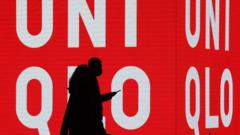The backlash against Uniqlo emerges following comments by CEO Tadashi Yanai, who stated that the company does not source cotton from Xinjiang, a region embroiled in controversy due to allegations of forced labor involving the Uyghur minority.
Uniqlo Faces Online Backlash in China Over Cotton Sourcing Policy

Uniqlo Faces Online Backlash in China Over Cotton Sourcing Policy
The Japanese retailer’s parent company's CEO statements on Xinjiang cotton spark calls for a boycott amid rising tensions.
Uniqlo, the well-known Japanese clothing retailer, is currently facing significant criticism from Chinese consumers after remarks made by Tadashi Yanai, the chief executive of its parent company, Fast Retailing. During a recent BBC interview, Yanai affirmed that Uniqlo does not source cotton from Xinjiang, a region in western China that has become the center of international scrutiny due to accusations of forced labor practices involving the Muslim Uyghur minority.
Following these comments, a wave of online dissent erupted on the Chinese social media platform Weibo, where users began to call for a boycott of Uniqlo. Trending topics included hashtags such as “Controversy over Uniqlo founder’s remarks," “Xinjiang cotton is the best in the world,” and “I support Xinjiang cotton.” One commenter criticized Uniqlo’s management stance, suggesting Yanai seems to underestimate consumer sentiment: "With this kind of attitude... can we stand firm this time?"
Yanai's statement that "we're not using [cotton from Xinjiang]" was accompanied by a hesitation to expand on the topic, indicating a clear awareness of the political sensitivities surrounding the issue. The situation has put Uniqlo in a precarious position, as China represents not only a massive consumer market for the brand but also a key manufacturing hub.
Compounding Uniqlo's challenges, other global brands that have publicly denounced Xinjiang cotton, such as H&M, have faced backlash in China, including the removal of their products from major e-commerce platforms. Yanai had previously avoided taking a firm position on the Xinjiang issue, which had allowed Uniqlo to navigate similar treacherous waters with relative ease.
As Western firms like Calvin Klein's parent PVH also come under scrutiny for alleged boycotting of Xinjiang cotton, the situation highlights the increasing difficulty international companies face in balancing ethical sourcing practices with their operations in China. The ongoing tension underscores the complexities of corporate social responsibility in an era of heightened global scrutiny and the potential repercussions for businesses that engage in politically sensitive dialog.

















